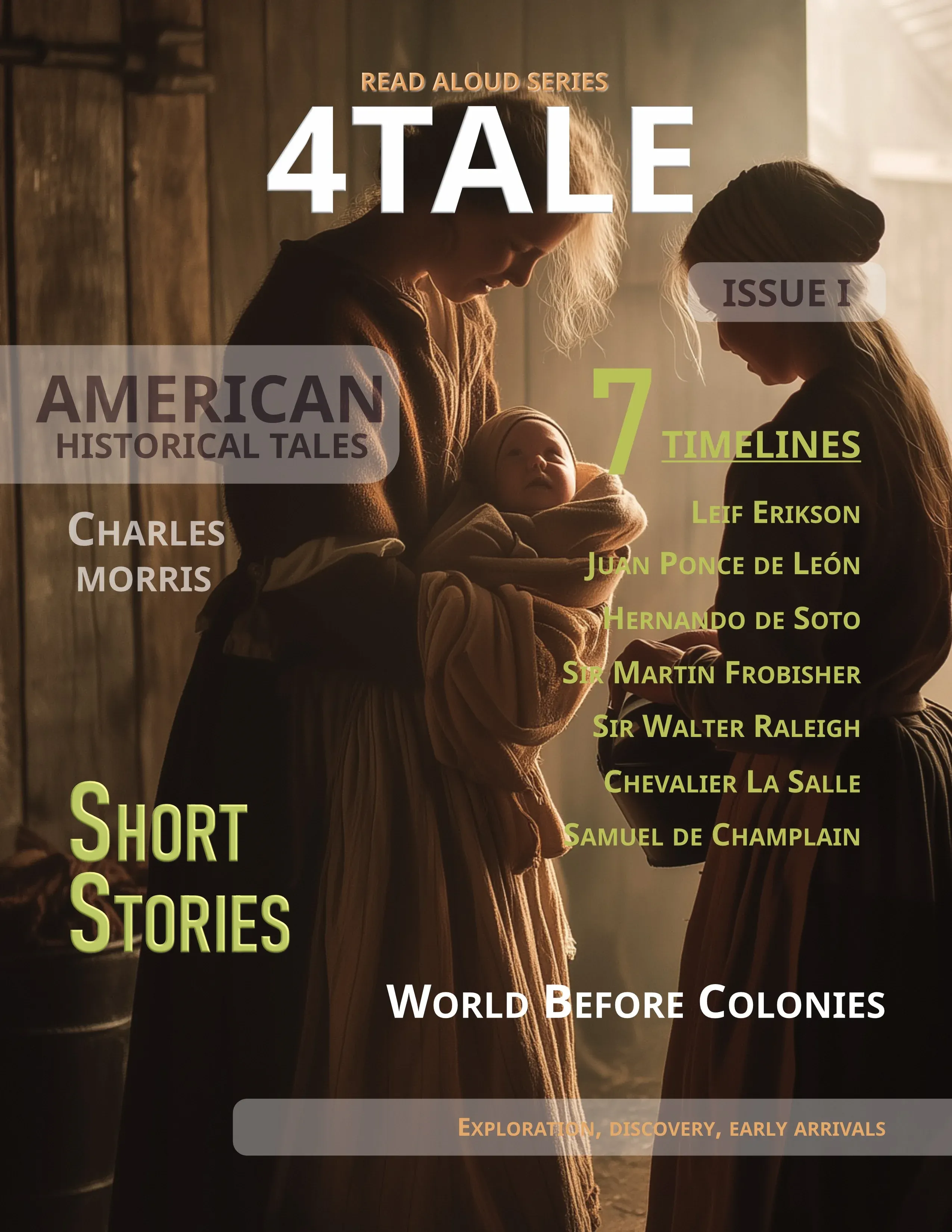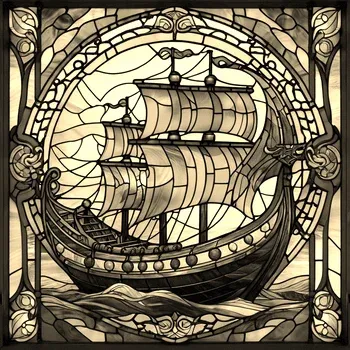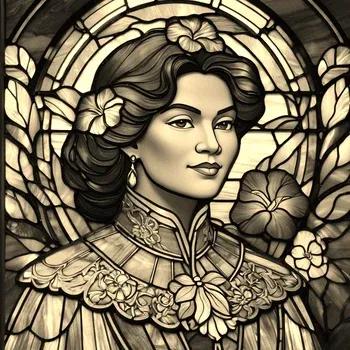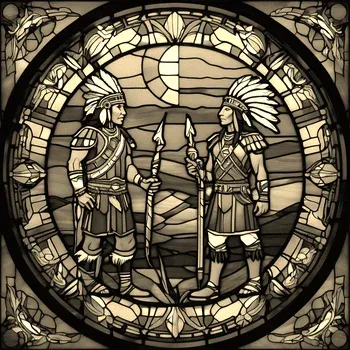BY CHARLES MORRIS
Frobisher And The Northwest Passage
Historical Tales 1 American: Story 2 of 27
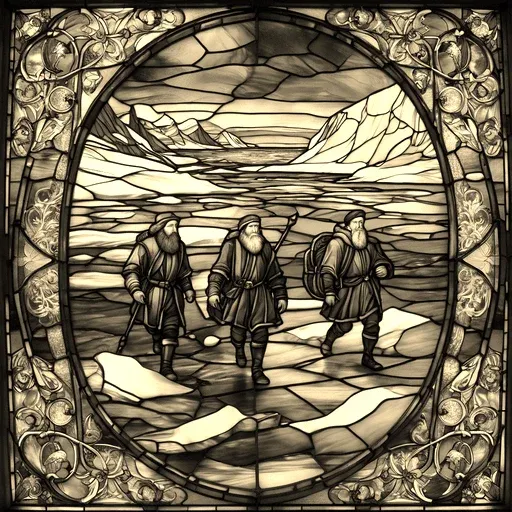
Heading
A Strait Named in Error: Frobisher's exploration led to the naming of the Frobisher Strait, a misnomer since he initially mistook the lands around the strait for the edges of America and Asia. This geographical confusion reflects the limitations of the period's navigational knowledge and the explorers' determination to find a Northwest Passage to Asia.
Enduring Legacy of Exploration: Despite the ultimate failure of Frobisher's quests to find a Northwest Passage or bring back valuable gold, his voyages significantly contributed to the geographic knowledge of the North Atlantic and Arctic regions. They laid the groundwork for future explorations and symbolize the unyielding human spirit of adventure, curiosity, and the pursuit of the unknown, reflecting the complex legacy of exploration that continues to fascinate and inform.
A good book we like, we explorers. That is our best amusement, and our best time killer
- Roald Amundsen, Explorer
Gold Lies, Frozen Seas, and One Hell of a Shortcut
England, mid-1500s. The Spanish were fat on gold. The Portuguese had their spice routes. And Queen Elizabeth? She wanted in. Not tomorrow—yesterday. So, they started chasing a ghost: the Northwest Passage. A shortcut through ice and fog, straight to the riches of the East. If it existed.
Enter Martin Frobisher. Rough-handed, storm-tested. Not the kind you paint on a coin—more the kind who survives by chewing leather and betting wrong with confidence. In 1576, he took a leaky little ship and pointed it north, into the cold teeth of the Atlantic. Ice cracked the hull, men puked from the sway, and Frobisher kept pushing.
He found land—Baffin Island, though nobody knew it by name—and slapped his name on a bay like he owned the place. Found shiny black rocks too. Thought he’d hit the motherlode. Gold, he said. Riches. Loaded a boat with it and sailed home like a man already dreaming of castles.
Except it wasn’t gold. It was pyrite. Fool’s gold. And that’s what they called it, after the fact.
Before the Fame - Martin Frobisher's Rough Start as a Nobody Sailor
He wasn’t bred for court. Born somewhere muddy, Yorkshire maybe. No fine clothes, no titles. Just salt air and bad odds. Started out young on the sea, where the work killed you fast or made you sharp.
He learned from waves, not books. Learned to fight, spit, swear, and steer through hell. Got good at spotting lies and storms. The kind of sailor who might stab the wind if it looked at him wrong.
When the crown started sniffing around for men dumb or desperate enough to find new worlds, Frobisher stepped forward. Didn’t promise riches. Promised he'd go farther than the last guy. And maybe not come back.
Into the Ice - Finding a Bay That Wasn't What They Thought
Gabriel was barely a ship—more like a floating coffin. Wind beat it senseless. Waves climbed higher than the mast. Men prayed, puked, froze. Frobisher didn’t flinch.
Weeks in, they saw land. Sharp. Cold. Silent. He named it like it was his: Frobisher Bay. Didn’t ask permission. Just did it. They found black stones. Glittered just enough to fool a desperate man.
They stuffed the boat full and turned back. Frobisher thought he’d struck it big. He hadn’t.
Meeting the Eskimos - When Two Worlds Crashed Into Each Other
Next trip, 1577. Bigger. Louder. He came back with more ships and bigger dreams. And he met people—Inuit. Hunters. Survivors.
At first? Curiosity. A trade here, a smile there. But smiles curdled fast. No shared language. Just guesses and fear. One man’s gift looked like another’s threat. Then men vanished. Then blades came out.
Nobody walked away clean.
Podcast
The "Gold" of Frobisher Bay: Initial Excitement and the Black Rock
Back in England, those black rocks sparked gold fever. People saw shimmer and lost their minds. The Queen backed him again. Investors threw coin at ships like they were buying futures.
So he went back. Miners came with him. Shovels. Picks. No idea what they were digging, just sure it would make them rich.
They hauled tons of it. Heavy, glinting lies.
Returning to England: Triumph and the Allure of Wealth
They landed to cheers. Frobisher smiled like a man who’d won. Handed over rocks like treasure. The Queen smiled back.
But time ruins lies. Tests came in. Not gold. Pyrite. Worthless. All flash, no substance. Frobisher’s legend cracked.
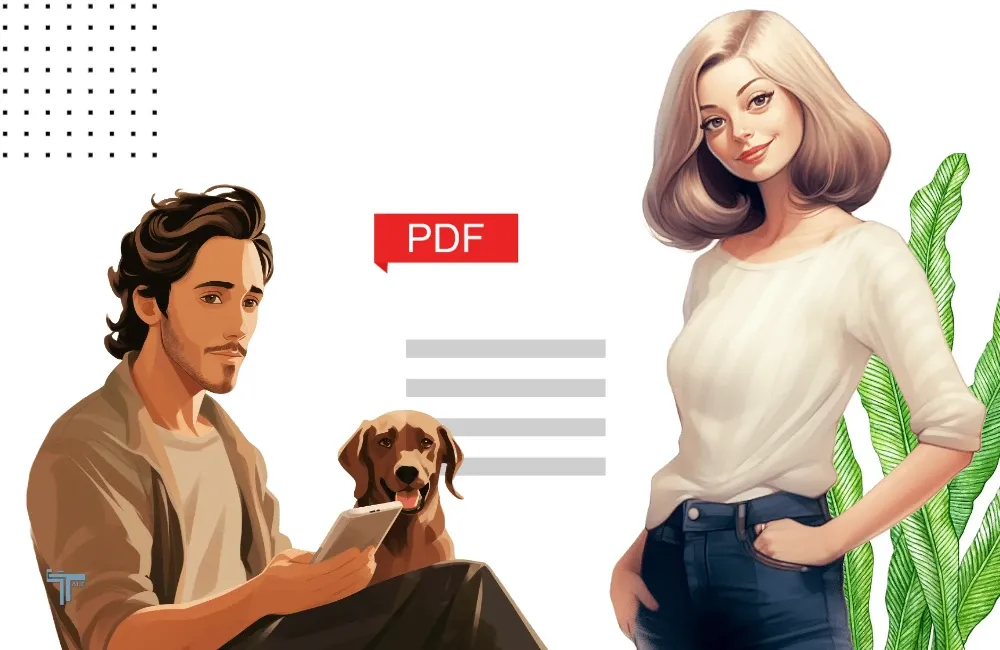
The Second Voyage: A Larger Expedition and Further Exploration
The next trip? A circus. More men. More gear. More belief in a bad idea. Frobisher wasn’t just exploring—he was trying to stake a claim. Maybe build a base. Make it permanent.
They mapped. They fought cold. They collected more rocks. Still no gold. But the coastline? They drew it, piece by frozen piece.
Mapping the Strait: Charting Unknown Waters and Facing Harsh Conditions
This was the Arctic in full. Ice didn’t care about ambition. It broke ships in half and laughed doing it. Ink froze in quills. Fingers cracked from cold.
But they kept going. Drew lines. Named places. Sometimes, just to prove they were there. Sometimes, because no one else ever had.
More Encounters with the Inuit: Conflict and Cultural Exchange
They met more Inuit. The misunderstandings piled up. Smiles turned into stares. Stares into shouts. Shouts into blood.
But deep down, the English saw something. These people knew the land. Could live in it, thrive in it. That stuck in their throats, even if they never said it out loud.
The Disappointment of the "Gold": Testing and the Revelation of Pyrite
More tests. More disappointment. The rocks stayed shiny, stayed empty. The dream turned sour. Frobisher had hauled back junk. Again.
No riches. Just broken picks and busted hope.
The Third Voyage: A Grander Scale and a Focus on Colonization
He came back with a fleet big enough to scare the clouds. They wanted to colonize now. Build something real.
Didn’t happen. Storms cracked the fleet. Cold killed the rest. No shelter. No food. The "colony" was a joke written in frostbite.
Arctic Reality Check - When Dreams Meet Frozen Hell
It fell apart. Starvation. Sickness. Despair. They bailed. Limped home like dogs in the rain. Nobody called them heroes anymore.
The Queen stopped asking. The investors stopped writing. Frobisher came back with nothing but silence in his pockets.
What He Actually Found - The Maps That Mattered More Than Gold
But the maps—those held. They mattered. Every inlet they marked, every coastline they traced—it all got used. Later.
He didn’t find gold, but he filled in blanks. That counts. Not much, but it counts.
Frobisher's Place in History: A Navigator's Enduring Impact
He died without riches. Without the fame he thought he earned. But his name? Still on the map. Still there.
He went further than most. Got lied to by rocks. Got beat by cold. And still—he kept moving.
What We Still Don't Know - The Questions That Won't Go Away
Why keep hauling that rock? Maybe he knew. Maybe he didn’t care. Maybe hope’s louder than truth when you’re frozen and desperate.
And the Inuit—we only know his version. What did they think, watching strangers dig into their land and rename it all?
This wasn’t just about Asia or treasure. It was about chasing ghosts and freezing while you did it. About getting up even when the sea knocked your teeth out. And that spark? That hunger to find something just over the edge? Still out there. Still burns.

